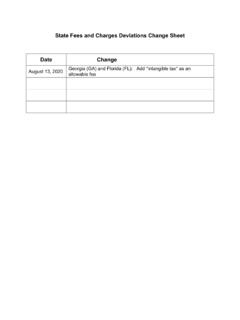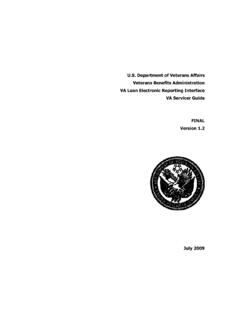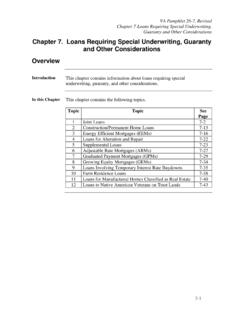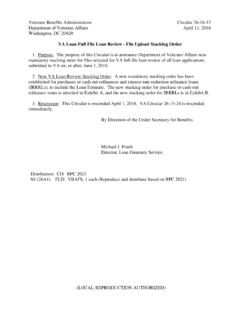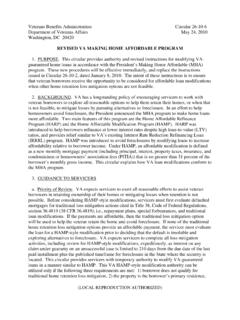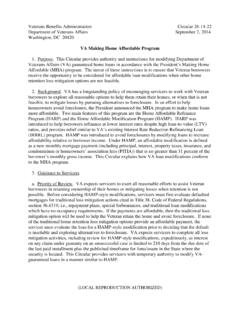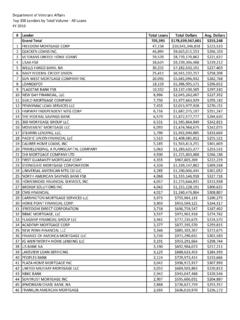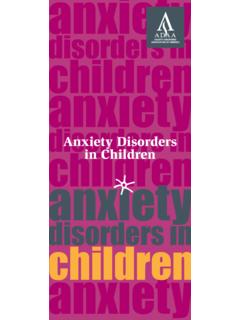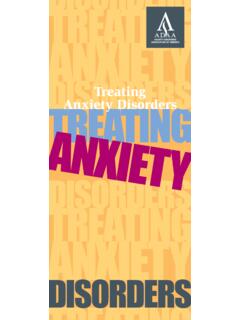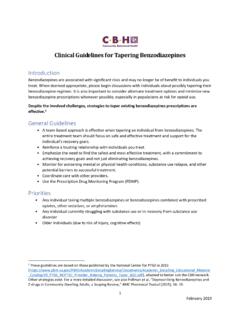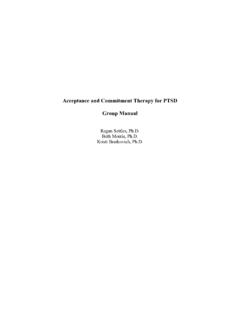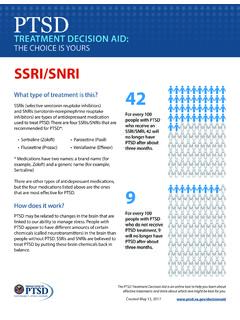Transcription of Traumatic Brain Injury (TBI) Examination Comprehensive …
1 Traumatic Brain Injury (TBI) Examination Comprehensive Version Name: SSN: Date of Exam: C-number: Place of Exam: Narrative: The potential residuals of Traumatic Brain Injury necessitate a Comprehensive Examination to document all disabling effects. Specialist examinations, such as eye and audio examinations, mental disorder examinations, and others, may also be needed in some cases, as indicated below. If possible, conduct a thorough review of the service and post-service medical records prior to the Examination . Health care providers who may conduct TBI examinations: Generalist clinicians, who successfully complete the Compensation and Pension Service (C&P) TBI training module, are permitted to perform TBI residual disability examinations, subject to existing VBA/C&P guidance on examiner qualification, including M21-1MR, A.
2 Review of Medical Records: B. Medical History (Subjective Complaints): 1. Report date(s) and nature of Injury . 2. State severity rating of Traumatic Brain Injury (TBI) at time of Injury . 3. State whether condition has stabilized. If not, provide estimate of when stability may be expected (typically within 18-24 months of initial Injury ). 4. Inquire specifically about each symptom or area of symptoms below, since individuals with TBI may have difficulty organizing and communicating their symptoms without prompting. It is important to document all problems, whether subtle or pronounced, so that the veteran can be appropriately evaluated for all disabilities due to TBI.
3 Also document all negative responses. For each of the following symptoms that is present, answer specific questions asked. a. headaches - frequency, severity, duration, and if they most resemble migraine, tension-type, or cluster headaches b. dizziness or vertigo - frequency c. weakness or paralysis - location d. sleep disturbance - type and frequency e. fatigue - severity f. malaise g. mobility - state symptoms h. balance - state any problems i. if ambulatory, what device, if any, is needed to assist walking? j. memory impairment - mild, moderate, severe k. other cognitive problems Y/N?
4 If yes, which?: i. Decreased attention ii. Difficulty concentrating iii. Difficulty with executive functions (speed of information processing, goal setting, planning, organizing, prioritizing, self-monitoring, problem solving, judgment, decision making, spontaneity, and flexibility in changing actions when they are not productive) iv. Other - describe l. speech or swallowing difficulties - severity and specific type of problem - expressive aphasia?, difficulty with articulation because of injuries to mouth?, aspiration due to difficulty swallowing?, etc. m. pain - frequency, severity, duration, location, and likely cause n.
5 Bowel problems - extent and frequency of any fecal leakage and frequency of need for pads, if used; need for assistance in evacuating bowel (manual evaluation, suppositories, rectal stimulation, etc.) - report type and frequency of need for assistance. o. bladder problems - report the type of impairment (incontinence, urgency, urinary retention, etc.) and the measures needed: catheterization - constant or intermittent?, pads (must be changed how often per day?), other - describe). p. psychiatric symptoms - mood swings, anxiety, depression, other (describe) q. erectile dysfunction - If present, state most likely cause and whether vaginal penetration with ejaculation is possible.
6 State type of treatment and if it is effective in allowing intercourse. r. sensory changes, such as numbness or paresthesias - location and type s. vision problems, such as blurred or double vision- describe t. hearing problems, tinnitus - describe u. decreased sense of taste or smell - if present, follow Examination protocol for Sense of Smell and Taste v. seizures - type and frequency w. hypersensitivity to sound or light - describe x. neurobehavioral symptoms - irritability, restlessness, other (describe) y. symptoms of autonomic dysfunction, such as heat intolerance, excess or decreased sweating, etc.
7 Z. other symptoms, including symptoms of endocrine dysfunction or cranial nerve dysfunction describe. 5. Report course of symptoms - are they improving, worsening in severity or frequency, or stable? 6. List current treatments, condition for which each treatment is being given, response to treatment , and side effects. 7. Describe any effects on routine daily activities or employment. C. Physical Examination (Objective Findings): Address each of the following and fully describe current findings: 1. Motor function. Report the motor strength of the affected muscles of all areas of weakness or paralysis using the standard muscle grading scale, for example, weakness of flexion of left elbow (3/5 strength for flexors), complete paralysis of left lower extremity (0/5 for all muscle groups).
8 To the extent possible, identify the peripheral nerves that innervate the weakened or paralyzed muscles, even when the weakness or paralysis is of central origin. Standard muscle grading scale: 0 = Absent No muscle movement felt. 1 = Trace Muscle can be felt to tighten, but no movement produced. 2 = Poor Muscle movement produced only with gravity eliminated. 3 = Fair Muscle movement produced against gravity, but cannot overcome any resistance. 4 = Good Muscle movement produced against some resistance, but not against "normal" resistance. 5 = Normal Muscle movement can overcome "normal" resistance 2.
9 Muscle tone, reflexes. Describe any muscle atrophy or loss of muscle tone. Examine and report deep tendon reflexes and any pathological reflexes. 3. Sensory function. Describe exact location of any area of abnormal sensory function. State which modalities of sensation were tested. Identify the peripheral nerve(s) that innervate the areas with abnormal sensation. 4. Gait, spasticity, cerebellar signs. Describe any gait abnormality, imbalance, tremor or fasciculations, incoordination, or spasticity. If there is spasticity or rigidity, assess any limitation of motion of joint (including joint contracture) by following the Joints Examination protocol.
10 (A tandem gait assessment (walking in a straight line with one foot directly in front of the other) is recommended.) 5. Autonomic nervous system. Describe any other impairment of the autonomic nervous system, such as orthostatic (postural) hypotension (if present, state if associated with dizziness or syncope on standing), hyperhidrosis, delayed gastric emptying, heat intolerance, etc. 6. Cranial nerves. Conduct a screening exam for cranial nerve impairment. If positive, follow Cranial Nerves Examination protocol. 7. Cognitive impairment. Conduct a screening Examination (such as the Montreal Cognitive Assessment (MOCA) or Mini-Mental State Examination (MMSE)) to assess cognitive impairment and report results and their significance.

